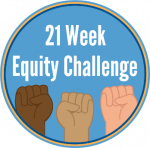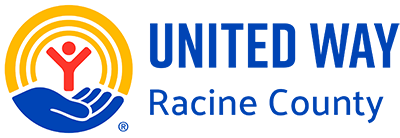
Our Equity Work
After much work and listening on the subject of race, equity and inclusion, we have developed a better understanding of the challenges our community faces when it comes to racial inequities. These inequities contribute to the disparities we see in the areas of health, education and financial stability and will continue to hold us back until we address them. Below, you’ll learn about the tactics United Way of Racine County has developed to progress towards equity and how you can get involved.
21-Week Equity Challenge
 The 21-Week Equity Challenge is an opportunity to develop a deeper understanding of how inequity and racism affect our lives and communities. The topics listed below take participants on a journey that starts with understanding internalized racism and inequity and explores how racism and inequity permeate individual interactions, institutions and social structures.
The 21-Week Equity Challenge is an opportunity to develop a deeper understanding of how inequity and racism affect our lives and communities. The topics listed below take participants on a journey that starts with understanding internalized racism and inequity and explores how racism and inequity permeate individual interactions, institutions and social structures.
Participants can review the emails listed below to deepen their understanding of inequity and racism, explore ways to take action and help launch what we hope will be a lifelong commitment to improving equity and inclusion in our communities. Individuals are encouraged to form groups for discussion and reflection - or take the challenge as an individual learning opportunity.
Want to experience the series? Check it out:
- Week 1: Welcome to the 21-Week Equity Challenge
- Week 2: Understanding Privilege
- Week 3: Understanding Stereotypes
- Week 4: Reflect
- Week 5: Internalized Racism
- Week 6: Internal Bias
- Week 7: Reflect
- Week 8: Interpersonal Racism
- Week 9: Microaggressions
- Week 10: Reflect
- Week 11: Institutional Racism
- Week 12: Racism in Media
- Week 13: Reflect
- Week 14: Participant Check-In
- Week 15: Structural Racism
- Week 16: Economic Mobility & Opportunity
- Week 17: Criminal Justice System
- Week 18: Education
- Week 19: Health & Healthcare
- Week 20: Reflection
- Week 21: Wrap-Up
Resources
- Best African American History Apps and Websites
- Our Diversity Statement
- Women's Resource Center Programs
WRC provides crisis intervention, advocacy, education and prevention services for people at risk of domestic abuse and/or sexual assault by promoting positive change for clients and the broader community of Racine County.
Watch/Read
- Journey to Freedom: Racine, WI Underground Railroad
- Read in Color Recommended Reading
Everyone can take part in the Read in Color program. That’s why this list of suggested books—recommended by Little Free Library’s Diverse Books Advisory Group and others—includes options for young readers, middle and YA readers, and adults. The recommended reading lists are far from exhaustive, but they offer a starting point for exploring different perspectives. - Visualizing the Legacy of Redlining
In 2023, a 24/7 Wall St. study marked Racine, Wisconsin as the second worst city for Black Americans. In these slides and the accompanying data visualization by Higher Expectations, discover how the continuing gaps between Black and white residents of Racine are rooted in decades-old redlining practices. - Women's History Month at UW-Parkside
Women’s History Month is a celebration of women’s contributions to history, culture and society and has been observed annually in the month of March in the United States since 1987. This year's theme is Women Providing Healing and Promoting Hope.
Events
- Gateway's Diversity 365 events (ongoing)
